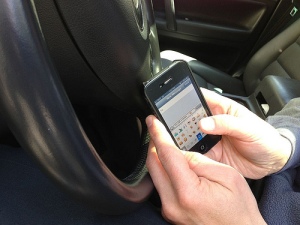Life after uni is possible, somewhat. I’ve been fortunate enough to complete my B Media in screen at UNSW and find work. I work with a video production company based in Wollongong and Sydney called Mane Collective. Check us out, or don’t. What ever.
How to Put the Phone Down on the Road.
In the past few weeks I’ve often criticized both governmental and some innovative approaches to solving the problem of texting while driving and distracted driving, so how do we stop it? Is it simply a behavioural issue of people forgetting about their phones? I don’t think so. While much of the opinion I’ve encountered while writing this blog has tried to simplify the problem to “well just put the bloody phone down”, it’s really not quite so simple as that (comments such as “people who text and drive deserve to die” also don’t help!).
Mobile devices have become deeply embedded into our lives, whether we like to accept it or not. Like the 7 second viral videos of the internet age and blockbuster films that shift from shot to shot like rapid fire, today attention is at a premium. So how do we encourage young people to stay attentive on the road when a two-minute video is often “too long”? Well as I have often suggested, I think through the technology we can find a solution, but herein lies another problem. Is there a way to stay connected on the road that doesn’t deflect attention away from the road? As we have seen, even the most socially accepted forms of communication while behind the wheel can be perilous. So is it a matter of a trade-off? Do we say voice recognition software or augmented reality headsets are an acceptable distraction due to the fact they minimize the risk?
In the end it is not for me to decide. All I can really say is, for the love of god, please don’t text and drive, I shouldn’t have to take losing someone you love or taking the life of another person to realize it is a really terrible idea.
Distracted Driving Laws in Need of Updating?
A recent Sydney Morning Herald article brought it my attention that the laws surrounding the use of mobile devices may be in need of some updating. Many of the apps I have spoken about on this blog use auto-receivers and responders to attempt to negate texting while driving. However it has come to my attention that it is illegal to:
‘Automatically receive the full text of an SMS on screen, even if the phone is out of reach or sight’
Meanwhile, it is completely legal to :
‘Use a hand-held phone while riding a skateboard, unicycle or roller blades’
AND also legal to:
‘Pick up a CB radio or two-way device while driving and talk on it’.
It all seems a little contradictory. Although with all this, ultimately a lot of what you get caught doing behind the wheel is up to the discretion of the police officer.
What I think needs to be done though is a greater awareness of how dangerous being distracted while driving can be. People are often trying to do everything BUT keep their eyes on the road: playing with the stereo, eating breakfast, smoking cigarettes. This all contributes the the attitude of “What’s the harm if I take a peek at my phone?”
In the end the laws and the general societal view SHOULD reflect the fact that it is dangerous to take your attention off the road, even if for a split second.
Serenity Now – How Do You Make Driving Safer?
One of the biggest difficulties that trying to stop texting while driving faces is apathy. A problem that has I’m sure plagued many public health and safety campaigns, including mine, is getting people to care. And when the supposed biggest offenders are young people, how do you make them care about being safe on the road? The conventional approach has been to bombard them with a frightening images that will scare them into obeying whatever it is you want them to do. The ends justifies the means, as they say. But maybe we should take a step back a little and to the side, for just a second.
Apologies if this gets a little abstract, but the problem I’ve always noticed about driving a car is the way it tends to dehumanize people. Hmm, let me try to explain what I mean. We often react differently in cars because instead of seeing another human being that is just as imperfect as yourself, you are faced with a big hunk of metal that is simply an obstacle in the way of my getting to yoga on time. What if instead of seeing a praise Jesus bumper sticker on the back of a car you saw a human face? Would many of us still be so impatient and impolite? Perhaps. On top of all this the act of driving becomes so second nature to us we forget we are actually driving this huge chunk of metal that could end our lives in one ill-timed sneeze.
So next time you’re driving, remember: it’s really not worth the risk. Put the phone down, take a deep breath and relax. Serenity Now.
A Tale of Two States – How Distracted Driving is being Treated in Australia
While the problem of texting while driving is much more int he mainstream in the US, it is interesting to look at how the problem has been addressed by the state governments here in Australia. The campaigns by the various road safety organisations is very revealing.
Victoria’s TAC have taken the conventional approach, resorting to (as most road safety campaigns do) scare tactics that show your careless and seemingly insignificant behaviour on the roads can affect many lives forever more.
In stark contrast to this is the campaign by the NSW RMS, that takes a much more lighthearted approach to the problem, attempting to use viral media – with a series of videos only featuring on YouTube and a series of adverts on the back of taxis and on buses with the slogan “Get Your Hand Off It”.
Research has shown scare tactics to be affective at awareness but more ineffective in creating any kind of behavioral change. While the NSW campaign may be seen as somewhat facetious, it is clearly targeting those whom road safety authorities feel is responsible for the distracted driving “epidemic” – young people. While i think the NSW attempt is a refreshing change to the scare campaigns of most road safety, it could be much better. It seems anytime a govermental organisations tries to be viral it becomes anything but.
Hands-free Distraction free?
I originally created this blog to promote the development of technologies to help put an end to texting while driving and distracted driving, but recently I’ve been having second thoughts. After reading several posts at The Safe Driver I’ve begun to wonder if technology is really going to help the problem. Some recent articles have suggested that hands-free technology may be more distracting than we think. If you think about it for a second, anything that takes our full attention away from the road – be it a Bluetooth headset or a phone – is going to effect our capacity to drive. In previous blogs I have suggested technology can make it possible to stay connected on the road but is this such a good idea? It may be the case that any technology no matter how great will take our full attention away from the road and therefore be only contributing to the problem.
On the other hand, wouldn’t it be great to just have the progress that less people are taking their eyes off the road completely to look at their phones? If they can dictate a response to their phone’s notification, keeping their eyes on the road at all times, is this no less distracted than checking the speedometer to make sure your under the speed limit? Accidents can take a split second and until the cars are driving themselves, can humans really be expected to be paying attention 100% of the time? Even the safest driver in the world is still human and open to a split-second of faded attention.
In my research of distracted driving it appears to me that the majority of people have unrealistic and extreme views of how to solve the “epidemic” of texting while driving. We can’t expect young people to text all their friends before they’re about to drive or install apps that are going to lock them out from their phone when it’s in motion. So what do we do, give up? No. I think more research needs to go into the behaviour of people driving distracted and offer better alternatives, that may not be perfect but are far more safer than taking your eyes off the road and typing 140 characters.
Apple Patent technology that could stop texting while driving
An older article however I think it’s definitely worth having a look at. Apple recently published a patent on technology that looks to curb distracted driving. While this is by no means a new development, the fact that Apple, a major player in telecommunications, has actually made an effort in the fight to stop texting while driving is significant. The patent involves technology that will involve a “device lock-out” system to detect when a person is driving and block all incoming alerts. As I have mentioned in previous blogs, this technique comes into numerous proposes. This issue involves discerning whether a person is actually driving and not sitting on a train or a passenger in the car. Another issue is the fact that as with most phone features, companies like Apple don’t want to annoy users anymore than the already do, thus offering an override function to blocking of alerts while driving. Given the number one offenders of texting while driving is teens, I can foresee this to be another feature turned off, if not just to conserve what little battery life smart-phones do offer. Considering Apple filed the patent way back in 2008, these very issues may be the just what’s holding Apple back from putting it in the next iOS.
Google Glass Double-Take
A few recent articles have surfaced based on some studies showing Google Glass to be “no safer” than phones for texting while driving. I applaud them for pointing out the glaringly obvious – that having emails and text messages pop into your field of vision while driving is distracting. The article entitled, ‘Google Glass “no safer” than phones for texting while driving’ actually manages to contradict itself numerous times in its few hundred words, going on to say “Glass wearers were more capable of regaining control of their vehicles” and “ Those texting using Glass … did return to driving normally more quickly afterwards”. But this isn’t what upsets about all this nonsense.
What annoys me is the ways in which they simply rule the technology out due to the fact that someones fat-head in your field of vision while you try to fact-time and drive is distracting. With the right apps this technology could significantly prevent texting while driving and distracted driving more broadly. “How?” You may ask. Well, let’s just think hypothetically here for a second. What-if instead of distracting you Google Glass helped you keep your attention to the road intact? It could wait until you’re stationary to make any alerts, it could even alert you to risks before you were aware of them! Hey, it could even warn you of a traffic miles before anyone else, THINK OF THE POSSIBILITIES. Sorry for yelling but it really is exciting that this technology, however unfashable, has the potential to change life as we know it, IF, put to the right uses, but that’s a big if.
So c’mon, let’s a least give it a chance first.
“From One Second To The Next”
To take things back a step, I thought I’d make a post about where I first came to be concerned with texting while driving and distracted driving more broadly.
As a film student, I try to watch as many new movies as I can and I’ve always loved German cinema. Werner Herzog has been a key figure in German cinema since the New German Cinema of the late sixties. Late last year he released a thirty-five-minute documentary entitled “From One Second to the Next” on the rise of deaths as a result of texting while driving. The film had a profound effect on me, causing me to reconsider my own distracted driving habits behind the wheel and pledge to commit all my concentration to the road when I’m behind the wheel.
The film rather interestingly doesn’t just focus on the families who has lost loved ones as a result of distracted drivers, but also talks to many of the remorseful young adults and teens responsible for killing and injuring people while texting behind the wheel, whose stories are even more revealing. The one that sticks in my mind most vividly is a young man responsible for killing a whole family of Amish people, all because a text just couldn’t wait a few minutes. The film really puts things into perspective – is a text really worth paying for for the rest of your life? These drivers can’t turn back the clock, only we can end this terrible habit.
The film is backed by AT&T the It Can Wait campaign, which, like this blog, is trying to put an end to texting and driving.
Watch the documentary here:
and take the pledge to stop texting while driving at http://www.itcanwait.com
The Evolution of Impatience
Today I was patiently waiting at the lights, tapping away to some tunes, a model citizen. The light turns green, the car in front remains stationary. I can see through the rear window – the driver has their eyes glued to their phone. A friendly-ish toot and we’re eventually on our way through an amber light.
We’ve all probably experienced this, and like most I’m probably at my most high-strung when I’m behind the wheel, it can be pretty frustrating.
The question I want to ask is – is it not better than doing it while driving? We all see it at every set of lights or in traffic, casual texting and driving. But is it that bad? Is it not safer than doing it while the car is moving at 60 km/h? At least the driver is recognising the danger of using their phone whilst in motion and all it’s really doing is, at worst, inconveniencing a few impatient drivers, eager to get home to have a beer and watch Family Feud.
On the other hand, the immediacy of modern communication has made it an incredible temptation, we devalue everything else around us, even person-to-person physical communication and make responding to this particular conversation the most important thing to me right now. Texting while driving wasn’t a problem when we had patience with communication. Yes “all we need is a little patience”. So, can we return to this bygone patience? I don’t think so, perhaps with the development of augmented reality (which could be an even bigger distraction) and voice to text technology there may be a solution, but not yet, so in the meantime: please pay attention to the road.




